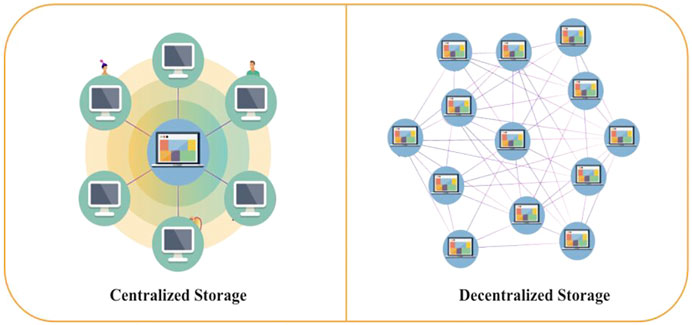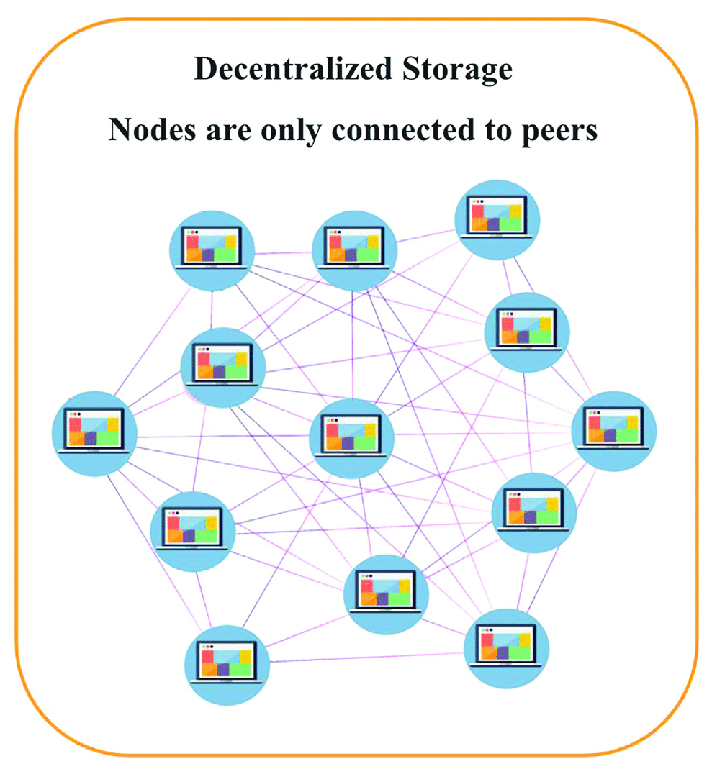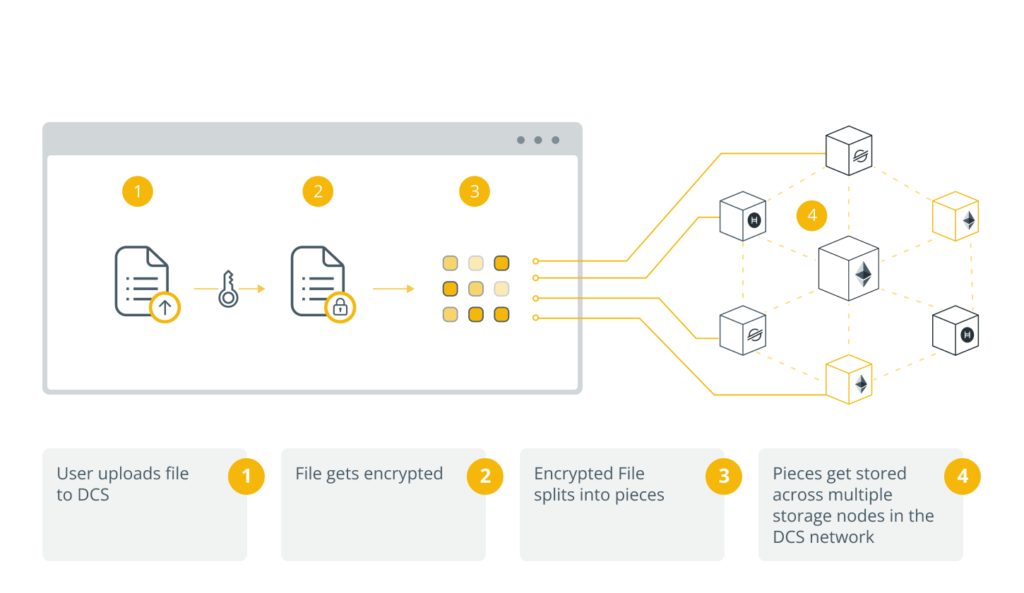Decentralized storage system relies on a blockchain-based decentralized network. It does not rely on a single centralized entity for providing a storage solution. In this approach, data resides on various nodes within the decentralized network. It is not stored on a single server controlled by a central authority. This increases security and reliability. It ensures that the data is distributed and protected against errors and potential risks. Decentralized storage options empower consumers with complete ownership and control over their data. They eliminate the need to rely on a third party for management and storage. Two examples of decentralized storage systems are InterPlanetary File System (IPFS) and StorX.

IPFS
IPFS is a decentralized, peer-to-peer file storage network. It enables users to store, access, and share files in a distributed manner. It ensures enhanced security, privacy, and scalability. StorX allows anyone to securely encrypt, fragment, and distribute critical data across multiple hosting nodes globally. StorX splits each file into multiple components, encrypts them, and stores them within independent storage nodes. These nodes are operated by different individuals across the world.
StorX
StorX is structured as a group of autonomous storage networks. This ensures that no single operator has complete access to a user’s data. With data fragments held by different operators, no single entity holds disproportionate influence. This enhances data security. The network also incorporates built-in privacy protection for personal data belonging to specific users.

How does the Decentralized Storage Systems work?
To comprehend how decentralization works in data storage, let’s consider an example: StorX provides a comprehensive understanding of decentralized storage. Not only does StorX offer the benefits of a decentralized storage network, but it also incorporates additional design advantages. Firstly, it divides each file into multiple components, encrypts them, and stores them in independent storage nodes operated by users worldwide. This exemplifies the decentralized storage mechanism in action.
Furthermore, the StorX network consists of autonomous storage networks, eliminating any specific operator’s control over the data. This ensures that no single operator can exert disproportionate influence over the data storage network. The decentralized storage blockchain networks inherently incorporate measures to protect users’ personal data, providing an added layer of security.
When users upload a file to the StorX network using their platform login and password, the network initiates a series of actions. It generates a unique private key and encrypts the file to safeguard its contents. Subsequently, the file is fragmented into smaller components and distributed across independent nodes located worldwide. This innovative approach represents a significant improvement over traditional storage methods. In fact, decentralized cloud storage surpasses conventional options by leveraging the advantages it offers.
One notable feature of StorX is its redundancy strategy. To ensure continuous availability of nodes, multiple copies of data fragments are created. This redundancy mechanism guarantees that even in the event of a node failure, the data remains accessible. As a result, StorX provides a reliable and resilient decentralized storage solution for users.

Storage Node Reputation Mechanism
To ensure high-quality standards in StorX, the storage node reputation mechanism utilizes an artificial intelligence-driven app. This app regularly checks the quality of all storage nodes and assigns a quality score based on the assessment performed. Moreover, the node reputation mechanism takes into account various factors that influence the reputation of each node. These factors include node efficiency, quality, location, and the amount of SRX staked. SRX, the native currency of StorX, powers the ecosystem.
Furthermore, in terms of efficiency, the mechanism considers the node’s adherence to updated security parameters and installation of server OS patches in a timely manner. The system prevents node concentration within the same internet service provider or location. This promotes decentralization and network resilience.
Benefits of Decentralized Storage System
Decentralized storage networks offer a range of advantages over traditional centralized storage servers, addressing some of the issues encountered in centralized systems. Let’s explore the benefits of decentralized storage in comparison.
Enhanced Security and Privacy
To begin with, decentralized storage systems provide improved security and privacy. Unlike centralized storage networks that keep data in a single location, decentralized storage systems enhance security by distributing data across multiple nodes. This distributed nature makes it more challenging for hackers to breach the system and access sensitive information. Additionally, decentralized storage allows users to store data without the need to submit personal details, ensuring an extra layer of anonymity.
Elimination of Single Point of Failure
Moreover, decentralized storage networks eliminate a single point of failure. While centralized storage networks are prone to transmission errors that can potentially result in data loss, decentralized storage networks consist of interconnected nodes, offering redundancy and fault tolerance. Even if one node goes offline, users can still access their data from other nodes on the network, ensuring continuous availability.
Faster Download Speeds
In addition to improved security and fault tolerance, decentralized storage networks provide faster download speeds. Centralized storage can experience congestion during periods of heavy traffic, leading to slower download speeds. However, in decentralized storage, thanks to the utilization of blockchain technology, data files are stored on globally dispersed nodes, reducing bandwidth usage. This decentralized approach potentially improves download speeds and enhances user experience.
Cost Advantages
Furthermore, decentralized storage systems offer cost advantages. With more storage capacity available through numerous nodes, decentralized storage platforms often have lower costs compared to centralized providers. This cost reduction is particularly beneficial for smaller users who may not benefit from economies of scale offered by centralized storage providers.
Enhanced Data Integrity
Last but not least, decentralized storage enhances data integrity. Centralized storage systems face challenges in maintaining data integrity when servers encounter issues or if webpages are relocated. On the other hand, decentralized storage overcomes these challenges by ensuring data remains accessible indefinitely. Additionally, techniques like hashing are employed to preserve data integrity throughout its lifecycle.
In conclusion, decentralized storage networks provide significant advantages over centralized storage servers. From improved security and fault tolerance to faster download speeds, lower costs, and enhanced data integrity, decentralized storage offers a promising alternative for users seeking a more secure, efficient, and reliable storage solution.
Limitations of Decentralized Storage System
While decentralized data storage offers several advantages over centralized systems, it is important to acknowledge the limitations that can contradict the aforementioned benefits. These limitations highlight the need for a balanced assessment of decentralized storage solutions.
Slower Access Times
One potential drawback of decentralized storage is the potential for slower access times compared to centralized systems. This drawback arises due to the reliance on a network of nodes to store and retrieve data. Consequently, this introduces additional latency, resulting in slower access times.
Security Risks and Dependency on Network Infrastructure
Furthermore, although decentralized storage can provide improved data ownership and security, it is not immune to risks. Malicious nodes within the network can compromise the security of stored data, posing a potential threat. Additionally, decentralized storage systems are dependent on the underlying network infrastructure. As a result, network outages or disruptions can significantly impact data availability.
Lack of Standardization and Encryption Challenges
Another challenge is the lack of standardization in decentralized storage. Different protocols may utilize varying encryption methods and authentication mechanisms, making it difficult to ensure seamless interoperability between different systems. Additionally, decentralized storage systems face unresolved issues concerning encryption and key management, adding complexity to their implementation and operation.
It is crucial to consider these limitations and address them when exploring decentralized storage solutions. While the advantages are noteworthy, it is essential to have a comprehensive understanding of the potential drawbacks. By working towards mitigating these limitations, we can foster a more robust and reliable decentralized storage ecosystem.
Development and Consultancy Services for Decentralized Storage Systems
Genesis Convergence specializes in providing development and consultancy services for decentralized storage systems. We leverage our expertise in this field to offer comprehensive support to clients throughout the entire lifecycle of their decentralized storage projects. As development experts, our team builds customized decentralized storage solutions from the ground up. We utilize our in-depth knowledge of blockchain technology and decentralized architectures to ensure the creation of secure, scalable, and efficient storage systems tailored to meet your specific requirements.
Additionally, our consultancy services provide valuable guidance and advisory support. We help you assess your needs, define project goals, and make informed decisions. Trust our company as your dedicated partner in developing a robust and efficient decentralized storage solution.
